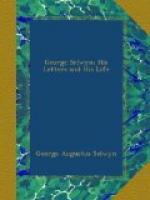Another friend, Henry St. John, begins a letter to Selwyn by telling how he and his brother went to see an execution. “We had a full view of Mr. Waistcott as he went to the gallows with a white cockade in his hat.” Not to be wanting in the ordinary courtesies of the time, Selwyn’s correspondent presently remarks, as one nowadays would do of a day’s grouse-shooting: “I hope you have had good sport at the Place de Greve, to make up for losing the sight of so notorious a villain as Lady Harrington’s porter. Mais laisons la ce discours triste, and let us talk of the living and lively world.” Selwyn made his world brighter by his wit and pleasantries, and the sight of an execution did not depress his spirits. “With his strange and dismal turn,” wrote Walpole, “he has infinite fun and humour in him."* And the author of a social satire blunted his thrusts at Selwyn by a long explanatory note which concludes with the remark that “George is a humane man."*
* Letters, vol. ii. 315.
* “The Diaboliad,” P. 18. See Chapter 3.
It was Selwyn’s fate—and in every generation we find some one of whom the same may be said—to have his characteristics or foibles exaggerated. It occurred to him in regard to witticisms and the sight of executions; he did not complain of this, for he knew it would be useless, but he disliked to be regarded as an habitual jester or as possessing an unnatural taste for horrors.*
* “George, as soon as the King had spoken to him, withdrew and went away, the King then knighted the ambitious squire. The King afterwards expressed his astonishment to the group-in-waiting that Mr. Selwyn should not stay to see the ceremony, observing that it looked so like an execution that he took it for granted Mr. Selwyn would have stayed to see it. George heard of the joke, but did not like it: he is, on that subject, still very sore.” ("Journals and Correspondence of Lord Auckland,” vol. ii. p. 210).
But another and more widespread habit is often referred to in his letters. The gambling which Selwyn disapproved, but indulged in for years, is constantly alluded to in his correspondence. The hold which this vice had upon nearly every one who regarded himself as belonging to the best society of London has never been more clearly and vividly depicted than in Selwyn’s letters. It was the protest— always varying, always taking new forms, but always present—against the monotony of life. Fortunes were nightly lost at Brooks’s and White’s, and substantial sums were gambled away by ladies of position and of fashion in the most exclusive drawing-rooms in order to kill time. Selwyn himself was a sagacious and careful man; but he was nevertheless a moderate gambler; he always perceived the folly of it; and yet for a great many years, he was constantly risking part of by no means a large fortune. The green table was the Stock Exchange and turf of the time, men and women frequented the clubs and drawing-rooms where the excitement




